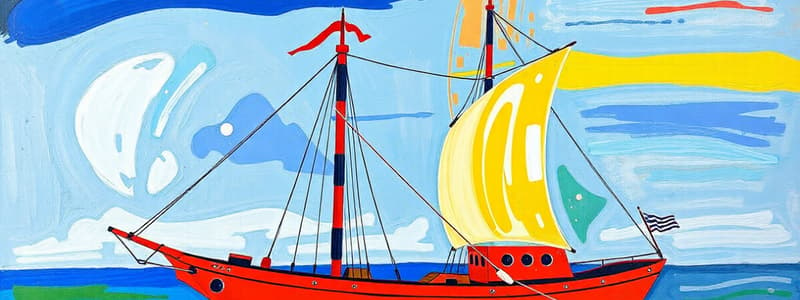Podcast
Questions and Answers
Which principle, central to Grotius' Mare Liberum, asserts that all nations should have the right to freely navigate the sea?
Which principle, central to Grotius' Mare Liberum, asserts that all nations should have the right to freely navigate the sea?
- Freedom of Navigation (correct)
- Exclusive Economic Zones
- Territorial Sovereignty
- Right of Conquest
According to Grotius's arguments in Mare Liberum, what should be the relationship between nations and maritime resources, such as fish?
According to Grotius's arguments in Mare Liberum, what should be the relationship between nations and maritime resources, such as fish?
- Exclusive control by the nearest coastal state
- Shared access for all nations (correct)
- Access only for nations with historic fishing rights
- Distribution based on naval dominance
Which legal basis did Grotius primarily use to argue for the freedom of the seas in Mare Liberum?
Which legal basis did Grotius primarily use to argue for the freedom of the seas in Mare Liberum?
- Treaty Agreements
- Natural Law (correct)
- Religious Doctrine
- Positive Law
What primary economic activity did Mare Liberum aim to protect and facilitate?
What primary economic activity did Mare Liberum aim to protect and facilitate?
What was Grotius' stance regarding territorial claims over the sea by individual nations?
What was Grotius' stance regarding territorial claims over the sea by individual nations?
What was one of the primary historical drivers for Grotius to write Mare Liberum?
What was one of the primary historical drivers for Grotius to write Mare Liberum?
What was a main point of criticism made against Grotius’s argument for the freedom of the seas?
What was a main point of criticism made against Grotius’s argument for the freedom of the seas?
What long term impact did Mare Liberum have on international maritime law?
What long term impact did Mare Liberum have on international maritime law?
Flashcards
Freedom of Navigation (Mare Liberum)
Freedom of Navigation (Mare Liberum)
The concept that nations should have the right to freely navigate the oceans, regardless of their location or purpose.
Freedom of Fishing (Mare Liberum)
Freedom of Fishing (Mare Liberum)
The principle that all countries can fish in the ocean's waters without restrictions or barriers.
Freedom of Trade (Mare Liberum)
Freedom of Trade (Mare Liberum)
Grotius's belief that nations should be allowed to trade freely across the seas without interference from other nations.
Rejection of Territorial Claims (Mare Liberum)
Rejection of Territorial Claims (Mare Liberum)
Signup and view all the flashcards
Basis of Natural Law (Mare Liberum)
Basis of Natural Law (Mare Liberum)
Signup and view all the flashcards
Protection of Commerce (Mare Liberum)
Protection of Commerce (Mare Liberum)
Signup and view all the flashcards
Common Use of the Seas
Common Use of the Seas
Signup and view all the flashcards
Common Access to Fisheries
Common Access to Fisheries
Signup and view all the flashcards
Study Notes
Introduction to Mare Liberum
- Grotius's Mare Liberum (1609) advocated for the freedom of the seas, a seminal work on international law.
- It challenged the idea of specific nations controlling the seas, asserting a universal right to navigation and trade.
- This work profoundly influenced international law, establishing principles for the high seas.
Key Arguments and Concepts
- Freedom of Navigation: Grotius argued the seas, unlike land, should be open to all nations.
- Freedom of Fishing: All nations should have equal access to fish within ocean boundaries.
- Freedom of Trade: Unhindered trade across the seas was a core principle for Grotius.
- Rejection of Territorial Claims: He opposed any single nation's claim over the seas, emphasizing shared access.
- Basis of Natural Law: Grotius drew on natural law principles, arguing the sea's nature implies these freedoms.
- Protection of Commerce: Free trade benefits all nations, and blockades or restrictions disrupt the natural order.
Historical Context
- Grotius wrote during a period of maritime expansion and colonial rivalries.
- European powers competed intensely for ocean trade routes and resources.
- The Netherlands, a significant trading power, sought to challenge existing claims of maritime dominance.
- Spain and Portugal previously asserted control over extensive stretches of ocean.
Significance and Impact
- Mare Liberum became a foundational text for international maritime law.
- It sparked debates about sovereignty over territories and navigational rights at sea.
- It prompted counterarguments from Grotius's contemporaries.
- Its impact on later water boundary developments is profound.
- It established the principle of shared use of the seas, unlike land ownership.
Criticisms and Counterarguments
- Grotius's ideas faced opposition from those profiting from controlling maritime spaces and trade.
- Opponents worried about potential trade disruptions from unrestricted access.
- Counterarguments stressed the need for order and security on the seas.
Contemporary Relevance
- Grotius's principles remain relevant in contemporary maritime debates about navigation and resource exploitation.
- The UNCLOS (United Nations Convention on the Law of the Sea) reflects Grotius's work in regulating ocean activities.
- Issues of ownership, freedom of navigation, and maritime boundaries are still subjects of discussion.
- Conflicts over ocean control represent modern-day manifestations of Grotius's arguments.
Studying That Suits You
Use AI to generate personalized quizzes and flashcards to suit your learning preferences.




